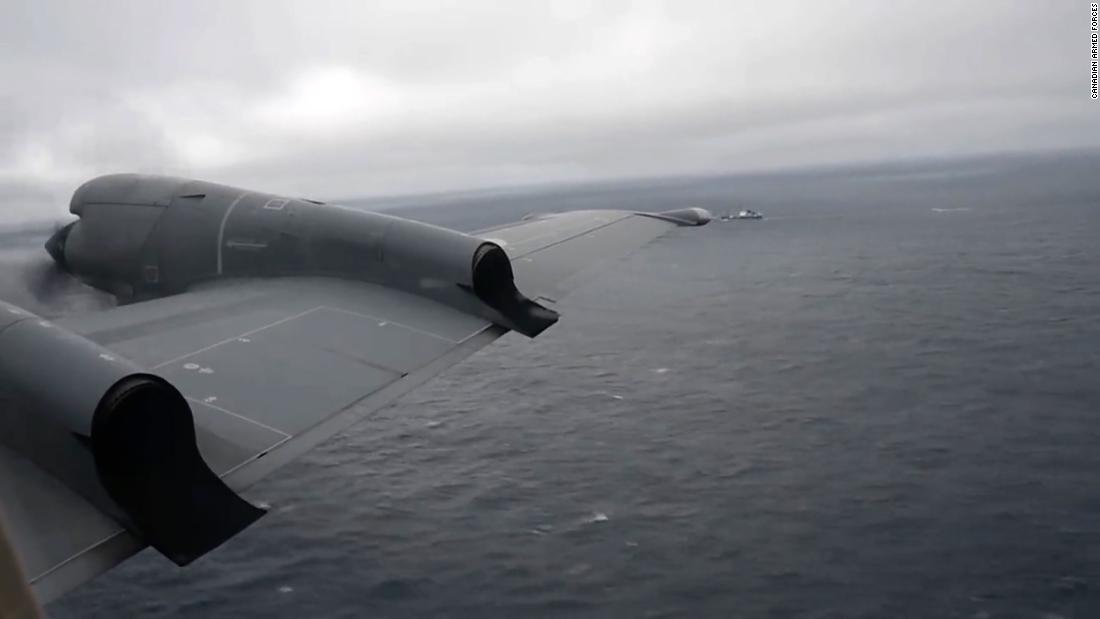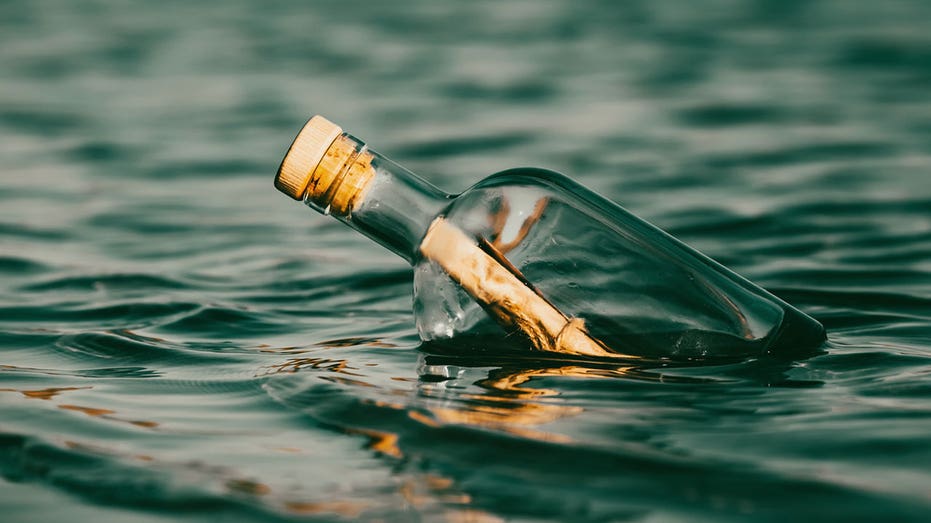- by foxnews
- 28 Nov 2024
Titanic-bound submersible suffered 'catastrophic implosion,' killing all 5 on board, US Coast Guard says

The Titanic-bound submersible that went missing on Sunday with five people on board suffered a "catastrophic implosion," killing everyone on board, US Coast Guard Rear Adm. John Mauger said Thursday.
The tail cone and other debris from the missing submersible were found by a remotely operated vehicle about 1,600 feet from the bow of the Titanic, which rests about 13,000 feet deep in the North Atlantic Ocean.
"This is an incredibly unforgiving environment down there on the sea floor and the debris is consistent with a catastrophic implosion of the vessel," Mauger, the First Coast Guard District commander, told reporters.
Follow live Titanic submersible updates
Five different major pieces of debris from the submersible, known as the "Titan," were found in the area, and each end of the pressure hull was found in a different place, according to Paul Hankins, US Navy Director of Salvage Operations and Ocean Engineering.
The families were immediately notified, Mauger said. "I can only imagine what this has been like for them and I hope that this discovery provides some solace during this difficult time," he said.
Minutes before the news conference, OceanGate Expeditions, the company that operated the deep-sea submersible, issued a statement grieving the five men on board.
"We now believe that our CEO Stockton Rush, Shahzada Dawood and his son Suleman Dawood, Hamish Harding, and Paul-Henri Nargeolet, have sadly been lost," OceanGate said in a statement.
"These men were true explorers who shared a distinct spirit of adventure, and a deep passion for exploring and protecting the world's oceans. Our hearts are with these five souls and every member of their families during this tragic time. We grieve the loss of life and joy they brought to everyone they knew."
A spokesperson for Pelagic Research Services confirmed to CNN its remote-operated vehicle, which was the first to search for the submersible on the sea floor, found the debris field.
The news ends a saga that began Sunday when the Titan began its descent to explore the wreckage of the Titanic. The expedition was billed as "a chance to step outside of everyday life and discover something truly extraordinary" and cost each participant $250,000, an archived version of OceanGate's website shows.
However, the cramped vessel lost contact with its mother ship about 1 hour and 45 minutes into its dive and did not surface as expected, prompting an extensive search and rescue operation in a remote area several hundred miles southeast of Newfoundland.
The expedition reflects the ongoing fascination with the Titanic more than a century after it hit an iceberg and sank on its maiden voyage, killing more than 1,500 people. The journey was also part of the growing business of wealthy adventure tourism, along with the space flights of Blue Origin or the rise of guided tours to Mount Everest.
The focus on the vessel has renewed criticisms of OceanGate's approach to safety from employees and other industry leaders. The 23,000-pound deep-sea vessel was made of an experimental combination of carbon fiber and titanium and relied on decidedly low-tech parts, such as a video game controller.
Mauger said authorities would begin to demobilize the medical personnel and nine vessels involved in the search over the course of the next 24 hours, but remote operations would continue on the sea floor for an undetermined amount of time.
The international search and rescue efforts kicked into high gear in the past few days.
The last communication between the vessel and its mother ship, the Polar Prince, came in at 11:47 a.m. Sunday. With no GPS underwater, the submersible was only guided by text messages from the surface ship.
A remotely operated vehicle was looking for the submersible on the sea floor, the US Coast Guard's Northeast District tweeted Thursday morning. An ROV from a French vessel was also deployed, and equipment from Magellan, the team that mapped the Titanic wreckage site last year, was headed to the site to assist.
Further, aircraft were scanning the expansive search zone, and medical personnel specializing in dive medicine and a hyperbaric recompression chamber arrived on scene Thursday, according to officials.
Mauger praised the interagency and international search efforts on Thursday, saying they had the appropriate equipment.
"This was an immense support and we had the right gear on the bottom to find it," he said.
Earlier this week, there were moments that offered hope to the family and friends of the missing vessel.
Banging noises were detected underwater Tuesday and Wednesday in the massive search area, though their origin was not clear. The underwater sounds detected by sonar devices on Tuesday first came every 30 minutes and were heard again four hours later, according to an internal US government memo update on the search.
"The Coast Guard has done a very good job in putting the right tools with the right team in the right spot. So, the chances are as good as they can be," Gallo, the senior adviser for strategic initiatives at RMS Titanic Inc., told CNN on Thursday morning.
The implosion of the Titan and deaths of those on board has put its operator's safety procedures under the microscope.
Rush, the CEO of OceanGate Expeditions, told a Mexican travel blogger in 2021 he wanted to be known as an innovator who broke the rules.
"I think it was (US Army) Gen. (Douglas) MacArthur who said, 'You're remembered for the rules you break,'" Rush told Alan Estrada, who documented his trip to the Titanic, including an aborted attempt in July 2021 before a successful visit in 2022.
"And you know," Rush added, "I've broken some rules to make this."
At least two former OceanGate employees years ago expressed safety concerns about the vessel's hull, including the thickness of the material used and testing procedures, CNN has learned.
OceanGate Expeditions strayed from industry norms by declining a voluntary, rigorous safety review of the vessel, according to an industry leader. If the company had pursued a certification review "some of this may have been avoided," Will Kohnen of the Marine Technology Society told CNN on Wednesday.
The company also faced a series of mechanical problems and inclement weather conditions that forced the cancellation or delays of trips in recent years, according to court records. The scuttled excursions led to a pair of lawsuits in which some high-paying customers sought to recoup the cost of trips they said they didn't take. The complaints alleged that the company overstated its ability to reach the Titanic wreckage.
OceanGate did not respond to the claims in court and could not be reached for comment.
Some expeditions were delayed after OceanGate was forced to rebuild the Titan's hull because it showed "cyclic fatigue" and wouldn't be able to travel deep enough to reach the Titanic's wreckage, according to a 2020 article by GeekWire, which interviewed the company's CEO.
Several reporters who boarded the Titan noted some of these issues.
For one, Discovery Channel's "Expedition Unknown" host Josh Gates and his team decided after a 2021 test dive of the Titan against filming a segment on the vessel as it "became clear to us at that time that there was a lot that needed to be worked out with the sub," he said.
"A lot of the systems worked but a lot of them really didn't. We had issues with thrusters and issues with computer control and things like that. Ultimately, it was a challenging dive," Gates told CNN's Anderson Cooper Wednesday.
"We were inside Titan for two or three hours, and there were a lot of things that weren't really ready for prime time, it seemed," he said.
The Titan generally carried five people: a pilot, in this case Rush; three paying passengers, in this case Hamish Harding, Shahzada Dawood and Suleman Dawood; and a content expert knowledgeable of the Titanic, in this instance Paul-Henri Nargeolet, according to OceanGate's archived website.
Harding, a British businessman and the chairman of aircraft brokerage Action Aviation, had a lengthy list of extreme expeditions under his belt. In 2019, he was part of a flight crew that broke the world record for the fastest circumnavigation of the globe via both poles, and in 2020, he became one of the first people to dive to Challenger Deep in the Pacific Ocean, widely believed to be the deepest point in the world's oceans.
Last year, he paid an undisclosed sum of money for one of the seats on Blue Origin's space flight.
The Pakistani billionaire Shahzada Dawood and his son, Suleman, were part of a prominent Pakistani business family. Dawood Hercules Corporation is among the largest corporations in the country, with a portfolio spanning energy, petrochemicals, fertilizers, IT, food and agriculture.
Nargeolet, an acclaimed French diver, had decades of experience exploring the Titanic. He served as the director of underwater research at RMS Titanic Inc., the company that has exclusive rights to salvage artifacts from the ship.
According to his biography on the company's website, Nargeolet completed 35 dives to the Titanic wreck and supervised the recovery of 5,000 artifacts. He spent 22 years in the French Navy, where he rose to the rank of a commander, the website says.
CNN's Rob Frehse, Oren Liebermann, Laura Ly, Kristina Sgueglia, Greg Wallace, Paul P. Murphy, Curt Devine and Isabelle Chapman contributed to this report.
- by foxnews
- descember 09, 2016
Mom's message in a bottle found by her own daughter 26 years later
A fourth grader went on a school trip when someone found a message in a bottle containing a letter that was written by her mom 26 years ago. The message was tossed into the Great Lakes.
read more


